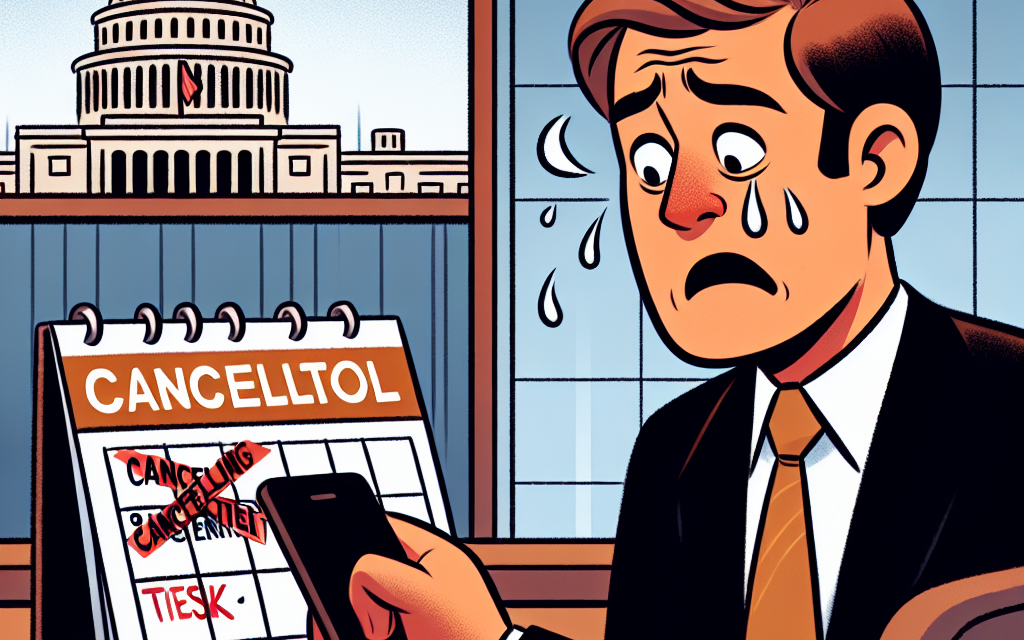RFK Jr. Cancels Appearance Before Senate Panel This Week
Robert F. Kennedy Jr. (RFK Jr.), a prominent environmental attorney and political figure, recently made headlines by canceling his scheduled appearance before a Senate panel. This decision has sparked a flurry of discussions and debates across various platforms, raising questions about the implications of his absence, the context surrounding his political career, and the broader issues at play in American politics today. In this article, we will explore the reasons behind RFK Jr.’s cancellation, the significance of his political stance, the reactions from various stakeholders, and the potential impact on his ongoing campaign for the presidency.
1. Background on RFK Jr. and His Political Aspirations
Robert F. Kennedy Jr. is not just a name; he is a legacy. As the son of the late Senator Robert F. Kennedy and the nephew of President John F. Kennedy, RFK Jr. has long been a figure of interest in American politics. His career has spanned various fields, including environmental law, activism, and more recently, a bid for the presidency in 2024.
RFK Jr. has positioned himself as a candidate who prioritizes environmental issues, public health, and civil liberties. His advocacy against vaccine mandates and his controversial views on public health have garnered both support and criticism. His campaign has attracted a diverse coalition of voters, including those disillusioned with the traditional two-party system.
In recent months, RFK Jr. has gained traction in the political landscape, appealing to voters who are concerned about government overreach and the erosion of personal freedoms. His platform emphasizes the need for transparency in government and accountability for corporate interests, particularly in the pharmaceutical industry.
2. The Cancellation: Reasons and Implications
RFK Jr.’s cancellation of his appearance before the Senate panel was unexpected and has raised eyebrows among political analysts and supporters alike. The reasons behind this decision are multifaceted and can be attributed to both personal and political factors.
One of the primary reasons cited for the cancellation is RFK Jr.’s ongoing health concerns. Reports indicate that he has been dealing with a series of health issues that have affected his ability to participate in public events. This has led to speculation about his overall fitness for the rigors of a presidential campaign.
Additionally, the political climate surrounding his candidacy has become increasingly contentious. RFK Jr. has faced significant pushback from both mainstream media and political opponents, particularly regarding his views on vaccines and public health policies. His decision to cancel may be a strategic move to avoid further scrutiny and to focus on his campaign messaging.
Moreover, the cancellation has implications for his supporters and the broader political landscape. It raises questions about his commitment to engaging with legislative processes and whether he can effectively represent the interests of his constituents if elected. The absence from a Senate panel, where critical discussions on public health and environmental policies take place, may be perceived as a lack of engagement in key issues.
3. Reactions from Political Stakeholders
The cancellation of RFK Jr.’s appearance has elicited a range of reactions from political stakeholders, including fellow politicians, public health experts, and the media. These responses reflect the polarized nature of contemporary American politics.
Supporters of RFK Jr. have expressed disappointment but also understanding regarding his decision. Many believe that his health should take precedence and that he should prioritize his well-being as he navigates the challenges of a presidential campaign. Supporters argue that his absence from the Senate panel does not diminish the validity of his platform or the importance of the issues he champions.
Conversely, critics have seized the opportunity to question his credibility and commitment to public service. Some political opponents have suggested that his cancellation is indicative of a lack of seriousness about his candidacy. They argue that a presidential candidate should be willing to engage with legislative bodies and address pressing issues directly.
Public health experts have also weighed in, emphasizing the importance of dialogue between elected officials and health authorities. They argue that RFK Jr.’s views on vaccines and public health are not only controversial but also potentially harmful. The absence from the Senate panel could be seen as a missed opportunity to engage in constructive discussions about public health policy.
4. The Broader Context of Vaccine Mandates and Public Health
RFK Jr.’s political platform has been heavily influenced by his stance on vaccine mandates and public health policies. His views have sparked significant debate, particularly in the wake of the COVID-19 pandemic, which has brought issues of public health and personal freedom to the forefront of political discourse.
Vaccine mandates have become a contentious issue in the United States, with proponents arguing that they are essential for public health and safety, while opponents, including RFK Jr., contend that they infringe on individual liberties. This debate has been further complicated by misinformation and distrust in government institutions, particularly among certain segments of the population.
RFK Jr.’s advocacy against vaccine mandates has resonated with many who feel that their personal freedoms are under threat. He has positioned himself as a champion of parental rights and individual choice, appealing to voters who are skeptical of government intervention in personal health decisions.
However, public health experts warn that such views can undermine vaccination efforts and contribute to the spread of preventable diseases. The cancellation of RFK Jr.’s appearance before the Senate panel highlights the ongoing struggle between public health imperatives and individual rights, a dynamic that will likely continue to shape political discourse in the coming years.
5. The Future of RFK Jr.’s Campaign
As RFK Jr. navigates the complexities of his presidential campaign, the cancellation of his Senate appearance raises important questions about his future prospects. His ability to connect with voters, articulate his vision, and engage with critical issues will be crucial as the election approaches.
Despite the challenges he faces, RFK Jr. has a dedicated base of supporters who are passionate about his message. His campaign has the potential to disrupt traditional political dynamics, particularly if he can effectively communicate his platform and address the concerns of undecided voters.
Looking ahead, RFK Jr. will need to find ways to balance his health concerns with the demands of campaigning. Engaging with voters through alternative means, such as virtual town halls and social media, may be essential in maintaining momentum and visibility.
Moreover, as the political landscape continues to evolve, RFK Jr. will need to adapt his messaging to resonate with a broader audience. This may involve addressing criticisms head-on and finding common ground with those who may not fully align with his views on public health.
Conclusion
The cancellation of RFK Jr.’s appearance before the Senate panel has opened up a dialogue about the intersection of health, politics, and personal freedom in America. As a candidate with a unique perspective and a storied family legacy, RFK Jr. has the potential to influence the political landscape significantly. However, his ability to navigate the challenges of his campaign, engage with critical issues, and connect with voters will ultimately determine his success.
As we move forward, it will be essential to monitor how RFK Jr. addresses the concerns raised by his cancellation and how he continues to advocate for his platform. The implications of his decisions will resonate not only within his campaign but also across the broader political spectrum as America grapples with pressing issues related to public health, individual rights, and government accountability.




